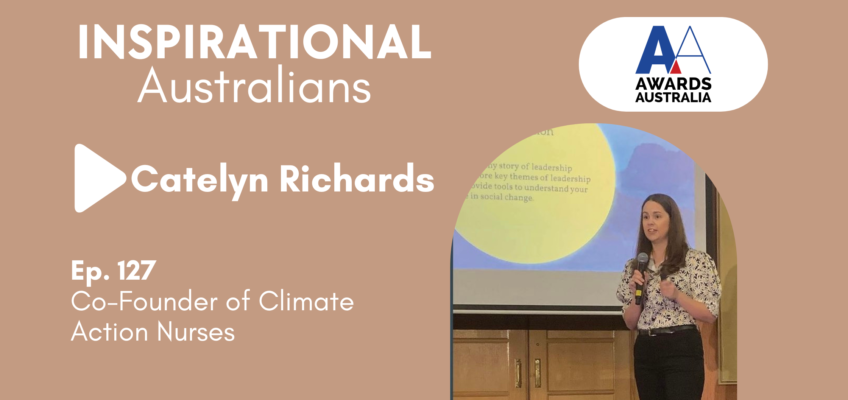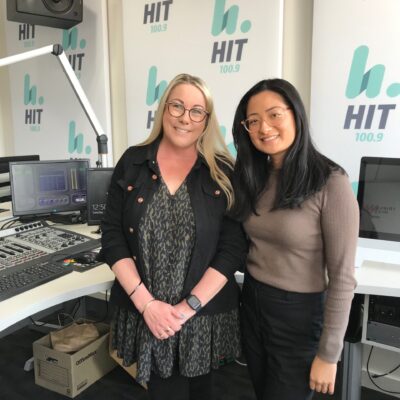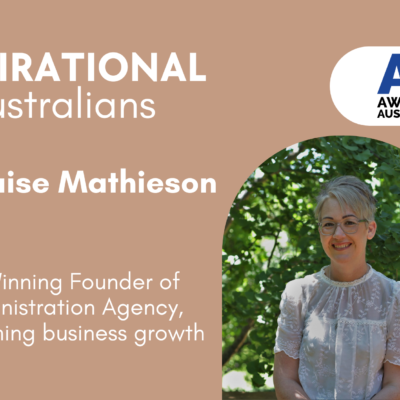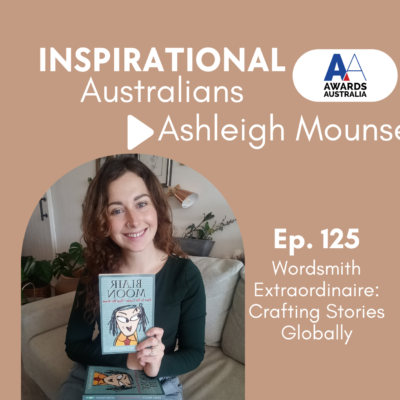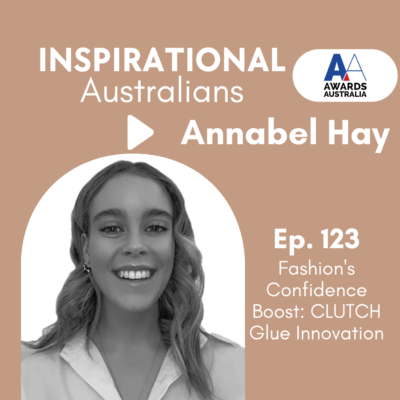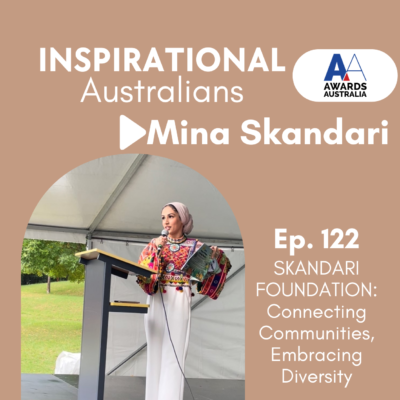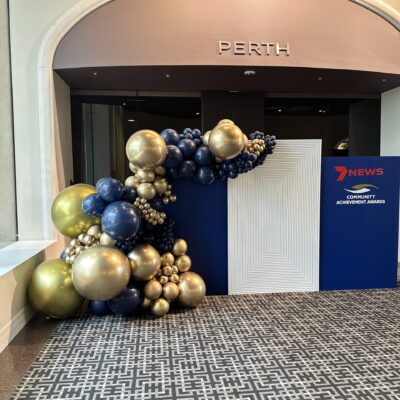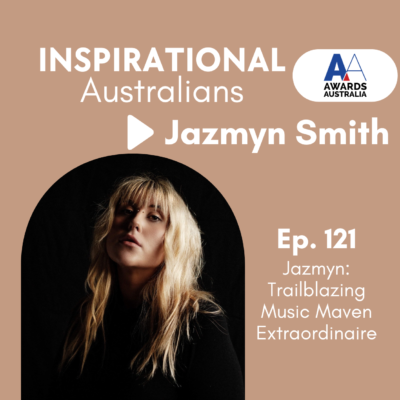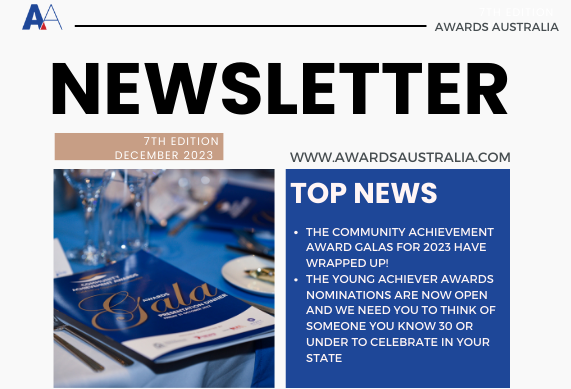>
In this week’s episode, Josh chats with Catelyn Richards – 2023 TAS Young Achiever Awards Finalist – St.LukesHealth Healthier Communities Award.
Catelyn is a proud Registered Nurse and co-founding director of Climate Action Nurses. She has been a co-contributor to 12 peer-reviewed publications through her work in the Monash University Wound Research Team and the Climate and Health Alliance. As a 2022 Westpac Future Leader’s scholar, Catelyn is passionate about delivering sustainable and equitable healthcare for all Tasmanians.
Connect Linkedin https://www.linkedin.com/in/catelyn-richards-4303766a/
Instagram https://www.instagram.com/climateactionnurses/
Facebook https://www.facebook.com/nurses4climate
Follow us on our Inspirational.Australians Instagram Page
Want to recognise someone making a difference? Nominate them now in 2 mins!
Find out more about partnering with Awards Australia
Transcript
[00:00:08] Christine
Welcome to inspirational Australians, where we share stories of Australians making a difference in their communities and in the lives of others. We get inspirational Australians acknowledge that we’re wondering and vulnerable people of the colour nation as their traditional owners and custodians of the lands and waterways on which this podcast is produced. We pay our respect to elders, past and present, and those who are emerging and extend our respect to all Aboriginal and Torres Strait Islander peoples. At inspirational Australians, we are inspired by the world’s oldest living culture and pay homage to their rich storytelling history. When we share stories on our podcast.
[00:00:58] Josh
Hello and welcome to your weekly dose of inspiration. Joining us here on the inspirational, strange podcast, fantastic to be joined by Catelyn this morning who I’m very excited to chat with. Who was a finalist, actually last year in twenty, twenty three for the Tasmanian young achiever awards in the saint Luke’s health, healthier communities award category. Catelyn Richards of Sheffield is a proud registered nurse and co-founding director of climate action Nurses. She has been a CO contributor to twelve peer reviewed publications through her work in the Monash University wound research team and the climate and health alliance. As a twenty twenty two Westpac future leader scholar Catelyn is passionate about delivering sustainable and equitable health Care for all. tasmanians. Welcome this morning to the podcast, Catelyn, how are you going?
[00:01:47] Catelyn
Thanks, Josh, thanks for inviting me. Yeah, great, it’s um, very, very happy to be here and to be chatting with each day.
[00:01:54] Josh
Yeah, that’s awesome. Well, I feel like anyone who’s been to a hospital or some kind of medical Uh, situation or knows a nurse in their family. They really understand the importance of Nurses in our society in everyday life. And I tell you what I probably haven’t seen, you know, someone in nursing who’s got this kind of um, varied range of skills and interests. Like you do in climate Uh, being involved with westpac’s future leader scholar. So I’m really interested to chat with you today. But before we get to all that stuff I wanted to find out. How did you get started becoming a nurse in the first place? What was your interest? Uh, what was your journey Uh, in that career.
[00:02:33] Catelyn
Yeah, look, it wasn’t um, I didn’t know that I always wanted to be a nurse. That certainly wasn’t something that um I had imagined when I was growing up that I would pursue nursing. And I think that speaks to why my career to date and my pursuits have been so Uh, all over the place is that, um for me, Um the thing that I was guided by growing up was that I wanted to make a difference in the community. I always knew that I wanted to be really active in, in, um, building a sense of Community and giving back to the community. And I was very interested in Uh, humanitarian and social justice, pursuits from a very young age. And um, through that, that sort of talk took me to a number of volunteer positions where Uh I found myself at Uh nineteen um engaging with the oak tree Foundation. Uh, which looked at poverty reduction. And through my experience with the oak tree Foundation and in um, taking on Uh different campaigns, I became more inspired about the difference that I could make in communities. And I was really lucky to be offered the opportunity to travel to the Solomon islands. Uh when I was eighteen and again when I was Uh, I think I was twenty at the time. And it was a relatively, um, incredible experience. I was partnering with aid and young people without borders and um, learning about Uh the aid program offered by Aussie aid at the time. And one of the key things that I learnt while I was in the community is that, um, often the most biggest impacts that we can make a dent in collaboration and done um in a really equal way. And I felt it sort of caused me to reflect a lot on, on what I wanted to contribute and how I wanted to collaborate in a way that was um, sincere. And so I thought on it and thought on it and um arrived at health Care and nursing as a means to really be with people. Um and I consider myself first and foremost a humanitarian and nursing is the outlet in which I can um be with people. Um and so it was actually a very um chance sort of decision but Uh taking me into nursing thereafter. I Uh have absolutely. Uh, no regrets about the experiences that I’ve had. Um, I’m just very lucky that I sort of arrived on it in the way that I did
[00:05:17] Josh
ER for sure. Well, I got to say a lot of eighteen and twenty year olds heading overseas. I probably partying, and Uh, doing a lot of crazy stuff and that’s amazing that you at that age were so interested not just in, in doing it locally, but then actually traveling overseas was that at the time, you know, would have been a pretty formative experience. I imagine
[00:05:40] Catelyn
it was, I think perhaps for me because um I developed some really close friendships over there. Um, so I was just working um as a support in a school um and the school was run by the most incredible person. Um, and I’m still very close with her today and I actually had the benefit through the Westpac Uh scholarship of going back to the Solomon islands last year and, and catching up with her again after ten years. And so that was just amazing. Um, and what I really learnt from her was just the importance of um you know, you seeing what you have as a means to, to give. And um, if you have um but you know, you don’t, you may not have all of the access access to resources. Um, you may not be incredibly wealthy, may not have all of the knowledge. Um, but if you’re prepared to, to give from a place of um abundance and saying that you have something to offer. Um then you just go with that and I think lane, the principal of the school is really instrumental in me realizing that um that when we actually partner in a really sincere way with communities, you can actually see a lot better outcomes. Um and so yes, I’m grateful for that Uh lesson and I, um, I’ve taken that with me as a nurse and a clinician. Um, in that everything that I do is as a nurse is it’s not about me or my ego. It’s about um, finding a way that I can actually have meaningful connections and make this experience as you say, that can be quite harrowing for patients. How can I make that as feel as safe and um and comfortable for them as possible?
[00:07:37] Josh
Yeah, yeah, for sure. So I guess going back to that age, you know you’ve started your nursing um journey, what kind of Uh field were you first um getting into
[00:07:50] Catelyn
in so when I started yeah. Um, when I started as a nurse, um I and actually for the most of my Uh, clinical work. I was working with children in pediatrics. And I, again this wasn’t an organic or it, um, it was an organic transition. It wasn’t. And my first thought of where I would end up as a nurse. Um I standard story, placements in pediatrics. And I just really loved the, the way that the teams operated. I think one thing that’s sometimes not um I suppose realized about pediatric carry is that a children don’t want to be in hospital. They don’t want to be sick. Most children, they want to be getting up and playing as soon as possible. So it’s such a um, incredible opportunity to be working as a health professional with someone who will try to get better as much as they possibly can. They’re so keen to, to get up and to, um, recover, and I really loved with pediatrics that part of my role was to create an experience for children that was less Uh, daunting. And so that included being a little bit silly um and Learning to communicate with children and um, or learning to communicate with the patient in a way that they could understand what was happening. Um, working with families. And I absolutely loved Uh, working clinically as a nurse and Uh, I think part of that was because I was working in pediatrics which was so um, there were days where I could sincerely hand on hearts. I was very fond because even though children were coming in sick um the the focus really was on um, how can we get this child feeling like themselves again up playing back at school, seeing their friends. Um and so I had a really positive experience working with the medical team and the allied health team we offer having conversations about um, what is the least harmful interventions that we can do to that will still create excellent patient outcomes.
[00:10:13] Josh
Yeah, I suppose you touched on a good point there because sometimes the perception can be a hardship because of all the negative things and seeing people sick and injured. But you’re right. You’re actively working towards positive outcomes for, you know, and so is there a balance there? ? Do you think between those kind of hard moments as a nurse and those rewarding moments?
[00:10:33] Catelyn
Absolutely. I think those things hold hands really. The hardest moments are often the most joyful. I remember um looking after patients that, that come in so unwell and you really look at the situation and think, you know, this is so abnormal, we’re not used to seeing children in this context. Um and that can be quite confronting to begin with. But working in the area that I was which was in flow in admissions, which is typical patient stay of between one to three days. I would often see a complete turnaround. Um, Uh, in the sense that patients were Uh, getting completely better recovery. And it’s not always the case, but just being with families and patients in those really difficult times is beautiful in and of itself. And there are Uh, thousands and thousands of memories that I’ve had where, you know, I’ve been able to be a part of quite a big life moment for families that are going into hospital. Um and some of the experiences they they have while they’re in, in the service. And um, as a young professional, it taught me a lot about patience. Humility advocacy for other um, it taught me about effective communication. How to really show up for people. Um, even if it’s a difficult day or even if it’s a difficult situation, I think that nurse is broadly doing an incredible job to um, really hold a space for patients so that they feel safe and so that they feel that they can um, be met with integrity and feel that their interests are being advocated for more broadly.
[00:12:26] Josh
Yeah, well, I can, I’m just getting a picture now, you know, understanding your initial passions and desire for helping the community and the experiences that you had as a clinical nurse. So this was obviously leading, you know, I shouldn’t put words obviously towards, Uh, you know, you getting into research and, and becoming a leader, I suppose, Uh, in various areas. So can you walk us through, you know, what was that moment where you kind of stepped into doing some of those things?
[00:12:55] Catelyn
Yeah, I think it was always um, quite a concurrent thing with research. Like I think one of the things that I noticed pretty early on in my professional career was that um and it was shared, the words were shared with me and they’ve been shared with me by multiple different friends. Um since is um the standard you walk by is the standard you accept and I I saw things while I was nursing that I thought, Oh I wonder if we could do this better. I wonder if there’s more efficiency that we could build into it. And quite quickly realized that, that way of thinking was actually um, something that I could really bring to the team that I was a part of. But there was probably one um turning point for me in my work. Um that I’m doing now with climate action, Nurses and in planetary health. And it happened when I was Uh, in my, I think I was in my fourth year of practice I, I’ve been going into my fifth um and I remember stepping out of my apartment and the air was thick with heat. It was hot and sticky and I remember breathing it in, it felt like I was you know, breathing in this really almost like it was breathing cream. And I went to, you know, what do I, the tired eyes jumped from a tram all up to the hospital and sat down for my hand drive with the outgoing nurse and the hospital was still dark. So we’re sort of having a bit of a conversation and the outgoing nurse pulls out these paper um charts, which was abnormal for me because I was working at the time in a predominantly digital hospital. So when you see the paper charts, you start to think, Oh, what’s happened overnight?
[00:14:45] Josh
It’s like, yeah, something’s going wrong here.
[00:14:48] Catelyn
Yes, I knew something was a bit awry. And um, he said to me, Uh, last night the Uh, air conditioning in the digital epicenter of our facility, Uh, it went down because of the heat. And the subsequent fallout was that all of the other um, computers and the digital epicenter itself had overheated um, causing a hospital wide outage. Well, which was um, huge because all about our records. Everything was so efficiently managed on this system. And I said to him, why do we know when it will be coming back online? ? And he said, no, no, there’s no indication of when, when we’ll be able to use it again. And for context. I mean this was occurring um during the Melbourne, Uh heatwaves at the time. So this was a back to back day event. And I think for me I’ve had a lot of experiences as a practitioner and as a social justice advocate. But this was the first time I felt really, truly afraid and concerned. It was overwhelming the sense that heat could have such an impact on hospital service. But also that I needed to be responsible for the patients that I was looking after. In this situation. Fortunately, the outage was really properly managed, it was very effectively managed by the organisation. Um and I put that down to the fact that we’re incredibly well resourced, resourced here in Australia. And we have the resilience to be able to meet some of these challenges. But I went away thinking a lot about the impact of extreme weather events on health service delivery. And not only that, my obligation as a health Care professional to be advocating um for really tangible changes to be made to reduce the impacts of extreme weather events and climate change on health populations. And of course being the date, I think that I am the cogs for turning. And I started to engage a lot more in the issue of climate change and understanding that climate change is a health issue and something that will um, not only cause disruptions to service delivery Um, as I experienced in my professional life, but also cause interruptions to health trajectories of patient groups. Um and that’s where I felt as a health Care professional that this is my responsibility. And my obligation to advocate for populations that are Uh, vulnerable and need um, the support of their health professionals to be advocating and taking action where they can. And that’s what led me to the work that I’m um doing now with climate action Nurses but also propelled as, as you mentioned, I was working in research but it propelled some of my research interests to be a little bit more about um okay, so, so what are the health impacts and what is the intersection between the nursing response with the Health impacts of climate change?
[00:18:02] Josh
A lot of people go through those experiences like the heat waves. We all yes, especially in Uh, some of the hotter States experienced them. A lot of people got that was annoying and then they move on. And so I, you know, I’m seeing this great pattern with you and as you said, the way your brain works that you’re like, all right, what’s, Uh, what we know, what do we need to do to actually help that in future situations? So you know, thank goodness we have people like Catelyn who are big thinkers and Uh, take that responsibility so seriously. So yeah. Tell us a bit about, Oh sorry you go ahead.
[00:18:38] Catelyn
Well I was going to just comment on that. I think that really is um, how I define and understand leadership. You know, I think that there’s a propensity for leadership to be seen as an accolade of achievement or um to be a position or title. Um and I know that sounds woefully cliche but for me, Um it was really um about, you know, what is it that you’re trying to actually do? ? I say leadership really is a function and I love the expression of um, you know, it’s how risk radical response to a calling. And for me I, I’m often looking for opportunities to identify what that calling is. And so I was um, engaged with um a higher a like a leadership program at the time Um, which was an emerging nurse later program and run by the Australian College of nursing. And I thought to myself, because this, the heatwaves that were occurring, I mean mere months later. Uh, we were then in Uh, actually months earlier, we had the eastern bushfires and then months after we were plunged into covid. And of course that was quite literally plunged into a full sort of plastic mask. And then dealing with um, patients concern and confusion about what was happening and some of the the ways that we needed to adapt as a society. And that to me was the question of what is it to be a leader in this contemporary context where there are some uncertainties. But um, there is also opportunity for people to identify, okay, this is a chance for us to be doing better and we can actually use this as a way as an impetus for us to change our health system for the better. And I think that if I had to comment on um, what sort of, Uh, leadership mission I ascribed to, at the time it was, I don’t want to be a part of just sort of passively waiting. I want to be a part of championing a cause that will actually improve our services. And I fundamentally believe that some of the best innovations that we’ve had in our country and also globally have come from points where we have had to step back and look at, Okay, this isn’t working how we had intended. How can we advance ourselves so that we are better?
[00:21:06] Josh
Um the thing I’ve always found interesting about climate change and the action that’s required is that it’s such a um, it seems like such a future problem like a lot of people would say, Uh, you know soon we need to put in some, Uh, some things in place to deal with that like a lot of the targets are for twenty, fifty or, or that kind of thing to reduce emissions. And then covid comes along and it’s so instant. And we had to be so immediately reactive to it. But I feel like with climate change, we have this opportunity to be proactive, but it’s just not happening for some reason enough.
[00:21:42] Catelyn
Yeah, I’d be inclined to agree. I think there are some opportunities that we’re not um yet seeing ourselves step into um and I think that’s part of the reason why climate action Nurses was Uh why I went on to co-found climate action Nurses. I found at the time so Fast forwarding back to twenty. Right? Yep. Fast rewinding back to I think it’s going back to the nineteenth of the day when we’d have to Rwanda Fast forward, but if we go back. Yeah, twenty twenty at the time. Um I didn’t see myself in the space which is um I Uh, I didn’t necessarily look to seeing climate change and immediately go Oh yeah, Nurses should be taking action on this. It wasn’t um, I felt like, Oh no, I really care about this issue. Am I going to have to now go and um, you know, study ecology or Uh, um climate science. And I think that that is perhaps something that a lot of health Care professionals can identify with this sense of. This is an issue that we should be caring about um, but what does that actually look like? And so when we started climate action Nurses with when I started climate action, as was with the Uh, four other co-founders aletha Mark and Diane, we were really setting about to paint a picture of how Nurses could be involved in climate action and how they could really step into something that felt meaningful for them not only in their personal lives but also their professional lives. So um we founded it with the four pillars of action which are policy, education, advocacy and research. The aim being that we would create a really strong Foundation. Uh um, evidence base, but also education materials so that anyone that joins um or anyone that starts to become passionate about the issue. Don’t have to go through the voices that we went through to understand um the key ways that they could be involved and that they key things that they could take on. And so I saw probably back then what you were mentioning about Uh are we doing enough? And I think the answer is always yes, but there is also I see now, so many groups popping up. And so many innovations um and I follow some really great podcasts and Uh, social media pages which celebrate some of the incredible achievements, spaces that we’ve saved. Um, emissions reduction across organisations, commitments from big corporations to reduce their emissions. And I think all of this has come about because people have felt a sense of optimism and hope that what we are doing is working and that we can actually um, make a difference through trying to be aggressive in our emissions reduction targets. But I will also speak to that Uh, climate change is just one small piece of um, the bigger broader puzzle which is Uh planetary health and Uh, through my work with climate action Nurses. I’m sort of saying that, um we need to look at ecosystems and the environment differently. The environment isn’t just this adjunct to human existence. It really out flourishing is completely dependent on flourishing ecosystems. And when that penny dropped for me, I actually felt a lot more hopeful and optimistic about health in general. I saw that instead of it being this extra thing that we have to do all we need to protect the environment. I started saying that I actually for my own health and for the health of populations, it’s actually more beneficial to take to care about this and to be really closely integrated with um the environment and making sure that our water. It’s clear, our air is um, breathable. I mean, I live in Tasmania where we have the clearest air in the world. So I can’t really say that that it’s too much of a problem down here. But that’s one of the things that I love the most about being in Tasmania is that it is so rich in um nature and that has time and time again proven many health benefits.
[00:25:59] Josh
So you know, you mentioned planetary health. Is it worth quickly expanding on that? I mean, I know you said you touched on it just then. So is that more of a really holistic view of literally our planet and earth and, and how the environment relates to each others. How we, you know, are in the environment.
[00:26:16] Catelyn
Yeah, yeah. It’s a great question. Um planetary health is as a phenomenon, it’s not new. It’s been um around for thousands of years and is actually um, quite um, embedded in a lot of Indigenous knowledge systems. As a term itself, it’s sort of emerged and been quite popularized in the last ten to twenty years. I’d say. And one of the key pieces was some of the work being done by the Lancet. Um looking at Uh, things like biodiversity and ecology and Uh, environmental systems as a means to be like a stable um Foundation for human health. And so it comprises lots of different elements, clear air, Uh, clear water and, and access to clean water. Soil. Uh like the microbiome of Soil and the integrity of Soil. Um of course climate change is Uh, mentioned in there, ocean acidification. Uh, all of these Uh, factors, and I’ve simplified here, but it’s a broader field that looks at if we um advance Oh um protection of these systems. How does that support human health and a classic example. I know it sounds quite um broad and it can get very um, broad and obviously as climate action as this, we’re focusing on one part but more broadly we advocate for planetary health as a means to advance human health. Uh, a classic example would be um, some of the research that is coming out about the Human microbiome and um, the gut brain connection, which I won’t go into the nitty gritty of the details. But um, researchers are Uh, doing some fantastic work looking at how our gut microbiome consort can support overall human health. Um, looking at longevity studies, there are some really fantastic pieces of evidence pieces of um, reporting down into communities and tribes that have um worked with um all have excellent microbiomes and seeing how that can cause Greater levels of happiness and fulfillment. Greater immunity, reduce rates of cancer. Um and our microbiome is actually supported by the food that we ate. Having a versatile um, you know, really vegetable and fruit rich diet. Um and you know, having access to really healthy foods can support the microbiome. And I mean that’s just um one example of how when we look at the connection between our environment and what we’re growing and what we’re eating and Human health, we know that when we ate a really healthy plant rich diet, we see wonderful health benefits. We also see with, with that example um, reduce lag clearing for for the way um that we produce crops and things. So um there’s some also climate and land degradation benefits too. So I think planetary health and may um, became this lens that I started saying, Oh okay, that’s really interesting. This is actually quite a positive way of looking at how we can really be, be engaged in the issue of climate and health. And so when I speak about planetary health, I always get a little bit more excited because I think things like starting your own garden in, in the backyard looking after the Soil in your backyard. Yeah. Um, you know, getting a worm farm composting so that you can have microbes. Uh, microbes entering the ground is actually a really fun way that you can engage in climate action. Because sometimes it can become a little bit overwhelming. And I think that this is a way that, you know, you don’t, yes, it’s important to be fired up about an issue. And to be, you know, have um, a bit of momentum behind you. But there are also some fantastic lessons of stewardship and custodianship that we can learn from Indigenous knowledge systems that are actually more about this overall sense of responsibility to the environment that also have really great benefits for our own happiness and sense of well-being.
[00:30:40] Josh
It’s very fascinating and, you know, I’d like that the that, that one example is so specific and we could just keep talking about it. We can have a whole podcast series on diving into
[00:30:52] Catelyn
you and I, let’s go.
[00:30:54] Josh
Yeah, you know, one hour on each tiny little thing, the episodes will be endless, wouldn’t they? If people are listening to this and as fascinated as I am, is there some resources you can point us to that that would be good for extra learning and kind of, you know, because I’ve got Kids. So when you’re saying stuff, I’m thinking, Oh great how fun but Uh, we’re fine. Be if the Kids involved helping teach them about that kind of stuff. So yeah. Where would you point people to if they had, you know, real interest?
[00:31:22] Catelyn
It’s really funny. You say that because every time my nephew comes to visit me here in Tasmania, he the first thing he wants to do, it’s not say hi to me. It’s where you went where the website was. Kids love worms. It’s what I’ve learnt um, but yeah, there are some fantastic resources and everything that I’m speaking about is actually a bit of a, a nod to some of those. Um, amazing pieces that are out there. Um, obviously the Lancet um commission and Rockefeller Foundation report on safeguarding human health in the anthropocene is my absolute go to it is a little bit dense um and there are some great synthesis of um, synthesis, pieces of that report. And the other piece that I always recommend to people is the book writing with sweetgrass it’s, it’s written by Robin wokoma who is an Indigenous ecologist. And one of the things that is so generous about her work is that she’s encouraging a connection to um, environment for all people. And she talks about how, you know, an invitation that she extends um to people that are non-indigenous or non-native is um, to become naturalized to place. And I love that analogy of being almost like an introduced um species in a way. And Uh, how can I, um, show I lost sheep through starting to learn about what it means to look after the environment. And as I said, it doesn’t need to be this. Um, really big, serious thing. I think it’s actually really quite accessible for people to just be engaged in nature for me that looks like hiking gardening um, being outside going for a swim at the beach. These are all things that really foster this sense of empathy and connection with the environment. So there’s some, Uh, great starting points um and of course climate action Nurses, we have some great resources that are available, particularly for Nurses, but even for non Nurses. Uh, some great educational resources and you know, it’s a, it’s a way that you can be connected with community as well. Remembering that sometimes it can feel a little bit lonely, leading and championing a cause, but you really aren’t alone. It’s just about finding a community and um, you know, connecting on a, on a I, I’ve been there as well. I’ve, I’ve had that experience. Um, so I think that that’s one of the things that climate action Nurses, first and foremost, tries to do is bring people together so that they can really workshop ideas and feel that that sense of Community.
[00:34:04] Josh
Yeah. So now you’re on Instagram at climate action. Nurses is there a website as well? People can, can check out.
[00:34:10] Catelyn
Yeah, you can find us at climate action, Nurses dot Org and um yeah, we’re more than happy to reach out. That’s also um climate action as is also our Facebook page. So do reach out if Uh, if you’re interested um in learning more, but also it’s free to become a member as well. And you become linked in with all of the other Nurses that are around the country. Um that are taking action and Learning about some of the things that they’re doing.
[00:34:37] Josh
Yeah, that’s fantastic. So I meant to ask you this earlier, and I hope you don’t mind me asking at the end, but you know, I’m so interested to hear what a day in the life of Catelyn Richards is like these days. Because you know, for me not being in the health field, it’s Uh, something I do, you know, I interested to find out.
[00:34:53] Catelyn
So it’s actually um the day it’s very different at the moment. Um, I’m not working clinically in the hospital as I’m sort of focusing my Uh, work more and um, developing some of the systems level overarching, what’s the most impactful way that Nurses can be engaged? So I am currently um doing some research pieces Uh on climate and health and also planetary health and integrating that with the nursing profession. So a lot of the day to day looks like some of that work, but I’ll be honest in saying, Josh, I think that one of the lessons that I’ve learnt through um, some of the initiatives that I’ve been a part of is that it’s so important to not become too far removed from what it is that you’re trying to achieve. So for me it really um, I do a lot of, Uh, integrating with things like the community garden in my local area, you know, speaking with communities, but also um, spending as much time as I can in a natural systems. Because to me that we’re in the environment because to me that is such a, a real way that I can um, be contributing to um, the area that I’m most interested in and keeping that, that passion alive. So it’s really varies from day to day. Um and um, absolutely loving, being able to advocate through some of the work that I’m doing and through the Westpac future leaders program um to be able to Uh, spread the message of um climate action and and um, planetary health.
[00:36:31] Josh
Well, Catelyn, it’s a wonderful segue because I’ve been meaning to ask you for this entire chat about the Westpac future leaders scholar. So you just mentioned it, tell us about what it is, how you was able to receive it. And then what was involved in the scholarship?
[00:36:46] Catelyn
Yeah, so the Westpac future ladies scholarship is a um, scholarship that’s offered to um, emerging ladies from any discipline to pursue some sort of postgraduate study or um, you know, PhD. And it’s really um, an investment from the Westpac Foundation in future ladies of Australia. Um, really investing in them to contribute to the area that they’re focused on. It was part of a very, um, amazing Uh, gift from Westpac to donate to a range of different scholarships um one hundred every year forever. And the Westpac future leaders is Uh, one part of those scholarships. So there’s Uh, a number of them. There’s the research fellow social change fellows, future leaders, um, Asian exchange and tech. I can’t remember the name of the tech scholarship though, so all up one hundred, every year. Seventeen of those are Westpac future latest scholarships and they’re sort of broken down into different universities. What it is is it’s um, an opportunity to undertake your program of study. Um, so that’s one component of the scholarship. They also provide leadership development training for the cohort. So they provide Uh, two opportunities to attend in person residentials where they give you intensive leadership development training and, and access I suppose to, um, some industry leaders. Uh, and the third component is the one hundred network. So every year, obviously there’s more scholars entering into that network. So an opportunity to really meet and connect with people who may be in a similar area, but may also just have skills and expertise to advance the um, area that you’re interested in. And the final is um, an international experience of your own, designed Uh, which as I spoke to you or alluded to earlier, one of the fantastic things that I was able to do was to visit Uh, the Solomon islands again. And to see um, some of the connections that I’d formed and it felt like a very surreal, returning to where I initially decided to pursue nursing. And I was also um able to, to be a panelist at a planetary health conference in New Zealand as well. So that was a really um, incredible experience for me. Uh, applying for it, it was, um, it’s, as I said, it’s available for anyone that has a postgraduate program of study or a program that they are wanting to participate in. And so I spoke to the masters that I wanted to complete, which is a master’s of leadership in health and Human Services. It’s a bit of a mouthful. Uh which was a um program offered by utas. And I um, sort of linked my passions in equitable and sustainable healthcare with nursing. How I wanted to pursue um systems policy so that we could really be more equitable and sustainable here in Tasmania. For the future. You have to be within your first six years of graduating. So it is really for those um future leaders or, you know, you’re taking that next step for your career and it was just such an incredible experience. Um and it’s well worth I can’t say how much I’ve got from the program and I know that I’m still going to be seeing benefits for many years to come great contacts. By the way of friendships, I think networks is always a bit of a dirty word. But for me, I’ve had some really great friendships that I’ve developed from the program. So it’s fantastic.
[00:40:24] Josh
Yeah, no, I think networks is, Uh, is a great you have to network. Uh and your network when you use it, I think you had a great, Uh you had a great way of putting it earlier, something about, you know, being intentional and authentic, potentially a company you, I wish I remember the exact quote. But if you do that with your network, it’s such a powerful tool for good. You know, for me personally I, I’m very lucky through our work and towards Australia, the young, the chief awards and the community achievement awards. To me and connect with lots of different people who are leaders who are community champions. And so that just keeps fostering positive change in our awards. What we’re trying to do because there’s people that come through the young entrepreneurs like yourself, you know, now you’re at that age where you’re kind of, Uh, not eligible for the young achiever. What do you say the kind way of saying thank you. Sorry. Um, I’ll take it and now you know, you’re a great contact to be potentially a judge moving forward to pass on the baton. You’ve been nominated now Uh, potentially nominating other people who are making great changes and it’s just, yeah, I love people when people, when they use their network for the right reasons, because it just helps us to give great opportunities to people and things like that.
[00:41:38] Catelyn
Yeah, I couldn’t agree more, I think a fundamental level, we’re just humans trying to connect with other humans. And so some of the conversations that I’ve had through Westpac and um, you know, also through some of the various programs that have been a part of that is great conversations. The things that you think you look back and you, you really extended. So that’s the way I sort of view that.
[00:41:59] Josh
Yeah. Well speaking of networks and you know, getting to know people and things like that you was mentioning earlier. You were in Melbourne. tassie. Uh, where were you kind of brought up and Uh what took you to tassie?
[00:42:12] Catelyn
Well, I was actually brought up on the beautiful North eastern coast of Tasmania. Um little seaside town. Uh, Bridgeport, which has about um, I think the population now is cracking seventeen hundred. Um, so very small town. And I think that that upbringing and, you know, for me, I grew up on five acres of native reforested um Bush, that my father had been dedicated to, Uh, rewild or keeping wild um, throughout my childhood. So it’s not a surprise to me that it’s such a deep Uh, connection for me. I environment in place. I was um, I left Tasmania purely for the volunteer work that I was engaging with at the time with I had the National headquarters in Victoria and I undertook my training in Victoria and act in nursing as a natural progression from that’s where I was at the time but the decision for me to come back to Tasmania was really this sense of um I think that congruent so that authentic actually I know who I am and this is where I need to be. And so it was a very um, difficult decision to come back to Tasmania in the sense that I had so many great connections in, in Victoria. And I felt at the time that I was really, it was really comfortable being there. But I knew for me personally um and the impact that I could make was calling me back to Tasmania. And I mean, the transition was just, it’s always tricky when you, when you come back to a place after some time. Um, the reasons why you left always come back. But for me honestly, after that first year of adjusting everything started to make sense. Again, I’ve just been so deeply connected to all of the things that I was really wanting to pursue. Um and I’m, I’m really, really thankful that I was that I acted on sort of these suspicions that I might not have been living a very truthful existence back when I was in um, Melbourne and in Victoria. Um and that perhaps the place where I would feel the most at ease would be where I’m from. And Tasmania is just such a wonderful place like it is really for the nature lover. It’s just incredible. But there’s also some amazing projects and a really fierce sort of loyalty to Tasmanian um, ways of being so. Yeah I, I think that that was a natural progression and very organic for what, what was what I was doing at the time. And what I’m trying to, um, what the message that I’m trying to spread.
[00:44:53] Josh
Yeah. Well the people I know from Tasmania and through our awards, you’re lucky enough to know, you know, quite a few. Everyone is so helpful, willing and quick to you know, atomic networks will connect you in with the right person to offer assistance. Very community. Um yes minded I feel so it seems like such a great place to to be living and Uh to enjoy that aspect of life.
[00:45:21] Catelyn
Yeah, I absolutely. And I mean it sounds like you have to move to Tasmania to, to be engaged in climate action. I’ve sort of painted it that way. I mean, it was definitely that my journey. Um, but I don’t, I don’t think those things are Uh, that’s necessarily true. I think you can really, if you’re identifying with the community, as you say, um and you feel like you’re connected in and you feel that it’s really true to what you’re doing, then you can just use what you have. And I think that that’s the biggest message for me in my journey is um, number one, being attentive to where you’re being called to and number two, using what you have um and working from that space. There’s a wonderful expression in yoga that they use, which is to stop people from trying to do the splits on day one, which is do what is available to you. And I think that I take that in many areas of my life, um and moving to Tasmania. Yes. Was really natural and was a very organic progression for me. Absolutely. I’m so happy to be here. There’s so much good that you can do in whatever community you’re a part of.
[00:46:31] Josh
Well, Catelyn, I’ve yeah, really enjoyed this chat so many fascinating moments and great little um, nuggets of wisdom along the way. And obviously Tasmania get on board sponsored this episode. Uh Tasmanian tourism. Yeah. Everyone’s going to want to go to tassie after this. Uh
[00:46:47] Catelyn
good. Come down the air as they say.
[00:46:49] Josh
Uh yes, that’s right. Well, Uh, you know, before I let you go though I did have one last question for you. You know, we’re on the inspirational australian’s podcast. Um, I’ve been inspired by some of those little nuggets of wisdom you’ve shared and your the way that you view the world and and for your health and your role in it. I think that’s been really, really amazing. Long run up, apologies, but the reason I’m Uh, kind of prefacing all that is I want to ask you Caitlyn, what is it that inspires you? Whether that’s big picture, whether it’s day to day, whether it’s someone in your life. Yeah. What inspires you?
[00:47:24] Catelyn
I think there’s a lot of things um that inspire me. Um, conversations like this really inspire me and listening to conversations like this. I’m really inspired by the good that’s being done in the world. And I think that that’s something we can often lose sight of when we’re looking to fix the world. Um and looking to advance changes that we can forget to look for the things that are actually um, really beautiful moments in life. And that really inspires me. Uh, in the work that I do. And if I could distill it down to the one thing that, that would be, it is looking for ways to feel powerful and to really identifying with that sense of empowerment and sense of looking at, um, what you have to be able to put that out into the world and I do want to say nature, I’m conscious that I have said it many times, but um, I think that the environment is an incredible source of inspiration for me and any time that I feel like um and it’s evidence based as well. Any shot that I feel like I’m a bit low on motivation that really keeps me going.
[00:48:35] Josh
Well, thanks for your time today Catelyn, I appreciate it. Just want to remind everyone they can find you on climate action. Nurses on Instagram, Facebook. Uh and on the website climate action, Nurses morgue, if I’m Remembering correctly.
[00:48:50] Catelyn
Yes. Yes. Thank you Josh. It’s been great having a conversation with you and yeah, it’s um, I’m looking forward to many more conversations with people as they engage with us
[00:49:00] Josh
for sure. Thank you very much, Catelyn.
[00:49:02] Catelyn
Thank you.
[00:49:08] Christine
The inspirational australian’s podcast is brought to you by awards, Australia. We recognise, celebrate and share the stories of inspirational Australians throughout awards programs across the country. To find out more, to nominate an inspirational Australian in your life, or to partner with our awards, visit awards, Australia dot com. If you enjoyed today’s story, we’d love it if you could subscribe rate and review to make sure you don’t miss an episode. And to help our guests reach more people with their inspirational stories stories.


